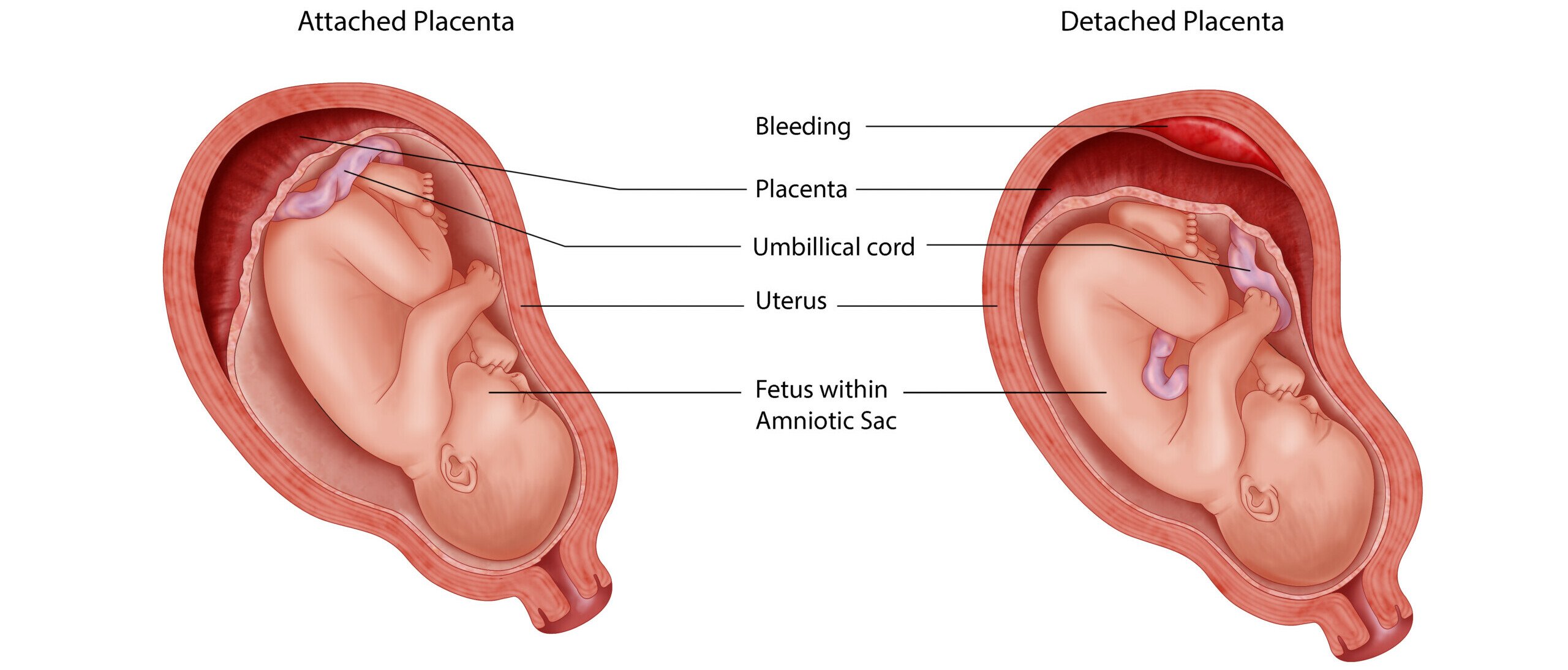
I was a nurse to a fourth-time mama when I experienced my first placental abruption. I tucked her into bed after an epidural for some much-needed rest. As soon as I sat down, I saw the baby’s heart rate had disappeared on the fetal monitor. No biggie, I thought; the baby had probably moved. I gingerly tried to find the baby with the fetal monitor while mom remained asleep, with no luck. I pulled back her sheets to get a clearer view for monitor adjustment, and the sight took my breath away: Blood and clots from her hips to her ankles.
The delivery room became a hurricane of activity. Within moments, our team rushed the patient into the operating room for a C-section. In six minutes, from discovery to birth, we saved the lives of mother and infant. Though rare, a placental abruption often happens without warning and is life-threatening.
What is a Placental Abruption?
A placental abruption, or abruptio placentae, occurs when the placenta’s blood vessels tear away from the inner lining of your uterus before the birth of your baby. Your placenta is the powerhouse and “middleman” of nutrient and oxygen transfer by blood from your circulatory system through the umbilical cord to your little one. Premature detachment interrupts the blood flow between you and your baby, causing significant problems for both of you.1
Placental abruption is a rare obstetric emergency that affects approximately 1% of pregnancies but is a leading cause of obstetric illness and fetal death. Many abruptions occur before 37 weeks but not always.1,2
Placental Abruption Causes
The exact cause of placental abruption is poorly understood and likely a combination of many things. However, several factors may put you at a higher risk for experiencing a placental abruption:1
- Preeclampsia or high blood pressure during pregnancy
- History of pre-pregnancy high blood pressure
- Multiple gestation pregnancy, such as twins or triplets
- History of a placental abruption
- Pregnant parent over age 35
- Polyhydramnios or an increased amount of amniotic fluid
- Short umbilical cord
- Sudden uterine decompression. Examples include water breaking with polyhydramnios or the delivery of a first twin.[1] (4)
- Smoking cigarettes
- Cocaine use during pregnancy
- Abdominal trauma resulting from a motor vehicle accident, a fall, or a violent encounter.
Is a Placental Abruption Visible on an Ultrasound?
Not really. Visualizing an active, concealed placental abruption on ultrasound is challenging because blood and placental tissue are similar in appearance. No laboratory tests or procedures can positively diagnose or predict a placental abruption. Diagnosis is made after birth by examining the placenta. Ultrasounds help detect and eliminate a diagnosis of placenta previa, another reason for vaginal bleeding.1
Placental Abruption Signs
There are no diagnostic tests for the identification of abruption, so a diagnosis is usually made by assessing clinical signs and symptoms and evaluating the placenta after delivery.
A placental separation from the uterine wall can be partial or complete.

The tearing away of blood vessels causes maternal bleeding and a lack of or limited blood flow to your developing baby. The bleeding can be concealed internally or present as vaginal bleeding. There are four classes of placental abruption based on signs and symptoms:1
Class 0
Asymptomatic or no maternal symptoms present. This is a partial separation shown by a blood clot on the maternal side of the placenta after delivery.
Class 1
A partial separation of the placenta from the uterine wall with no or minor vaginal bleeding, mild uterine tenderness, typical vital signs, and no fetal distress.
Class 2
Complete or central separation of the placenta from the uterine wall with no to moderate vaginal bleeding, significant uterine tenderness with unending contraction, maternal vital sign changes, apparent fetal distress, and lab work changes.
Class 3
Complete or central separation of the placenta from the uterine wall with no to heavy vaginal bleeding, a constantly contracted and tender uterus that does not relax, vital signs that indicate the patient is in shock (such as low blood pressure), lab work changes, and fetal death.
What to Expect If You Have a Placental Abruption
Placental abruptions are often immediate and unexpected. It is vital to contact your obstetrician or midwife if you notice the following:5,6
- Vaginal bleeding: While some non-worrisome vaginal bleeding may occur during pregnancy, speaking with your healthcare provider about any amount of bleeding is crucial.
- Severe abdominal pain: Any unending pain or contraction that does not go away. Remember that an abruption can occur without vaginal bleeding.
Your healthcare provider will direct you to report immediately to a hospital, potentially by ambulance, for an evaluation.
A placental abruption can also occur while in labor. If you are at a birth center, at home laboring, or anticipating a home birth, you must head to a hospital. Either way, you and your baby will be assessed quickly.1
If a placental abruption is suspected, many actions by the obstetrical staff will happen rapidly to ensure your safety and protect your baby’s life. Tasks, assessments, and medication administration may all happen at the same time with the goal of delivery:1
- Continuous vital sign monitoring, especially blood pressure and heart rate
- Blood lab draws
- Intravenous (IV) fluids
- Oxygen administration
- Monitoring of fetal well-being
- Medication administration
- Blood transfusion
- Immediate delivery
Depending on your health, the well-being of your baby, and the gestation of your pregnancy, immediate delivery, most commonly by C-section, may be necessary to preserve life. The discovery of Class 1 or mild abruption may result in admission to the hospital for close observation and monitoring, especially when considering gestational age and preterm birth.5,6
Complications of Placental Abruption for the Parent
Placental abruptions can lead to significant, potentially life-threatening complications for the pregnant parent include:1
- Severe bleeding requiring blood transfusions
- Bleeding disorders. For example, disseminated intravascular coagulopathy (DIC) because of overactive clotting factors that result in small blood clots circulating throughout the body.
- Hysterectomy or removal of the uterus
- Kidney failure
- Negative cardiac events
- Maternal death in 5-8% of patients in the United States
Placental Abruption Complications for the Baby
A placental abruption is a potentially life-threatening situation for your baby. Gestational age and severity of the abruption are the most significant determinants of your newborn’s survival. Due to complications associated with preterm delivery, the impact of placental abruption may extend beyond the newborn period for surviving babies. Complications for your newborn may include:3
- Preterm birth and low birth weight
- Birth asphyxia, or the absence of breathing at birth due to lack of oxygen during the birth process
- Cerebral palsy
- Cystic periventricular leukomalacia or damage to the white matter of the brain
- Brain hemorrhage
- Respiratory distress syndrome (RDS)
- Stillbirth
- Neonatal death for approximately 15% of infants
Can You Prevent an Abruption?
Unfortunately, placental abruptions cannot be predicted or prevented in most instances. However, recognizing the risk factors for placental abruptions may help anticipate dangerous pregnancy complications.
Smoking and cocaine are two of the most significant risk factors for placental abruption. Smoking cessation and drug counseling are highly encouraged. Your obstetric providers can connect you with available resources.1
Despite medical care and monitoring advances, childbirth can still be filled with many unknowns. In the case of placental abruptions, awareness, and attentive care are paramount.
from Baby Chick https://ift.tt/P6KfAHY
via IFTTT



0 Comments
Please ,
Don't enter span link ...